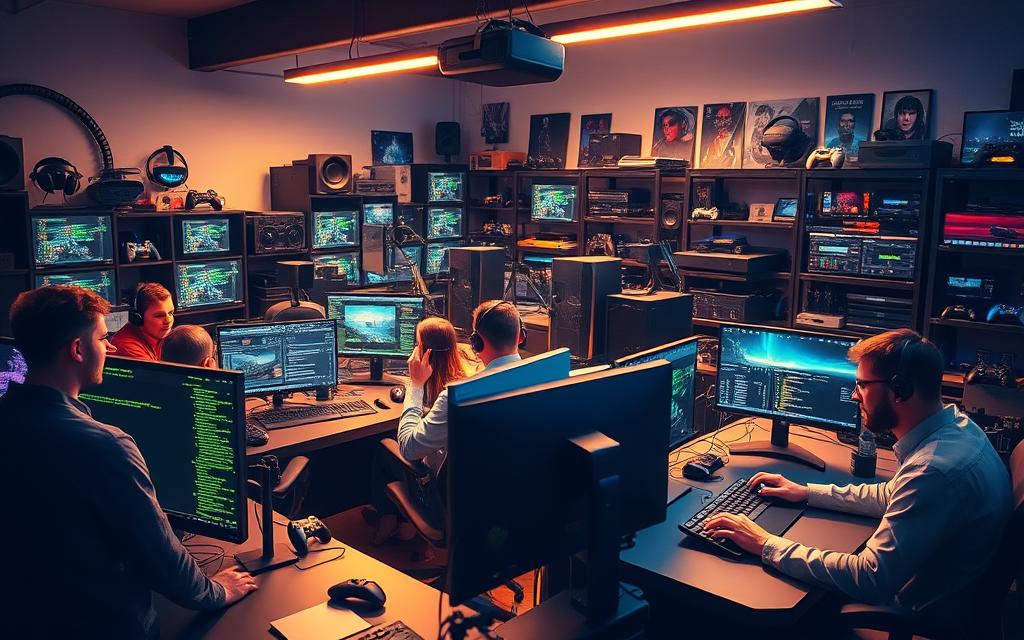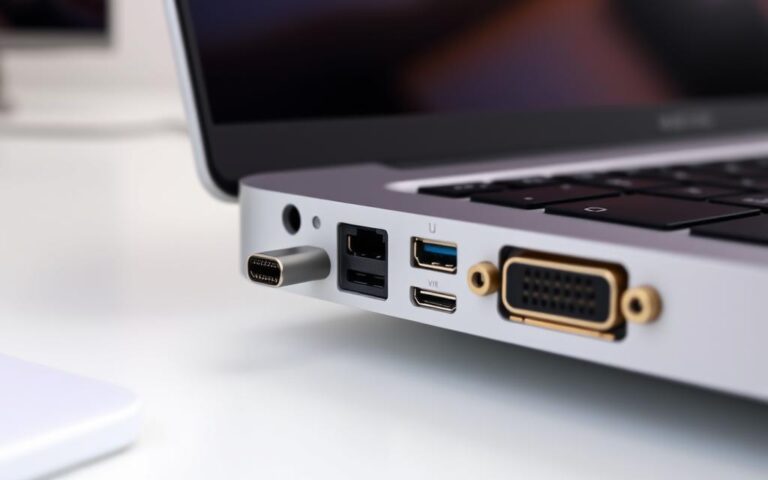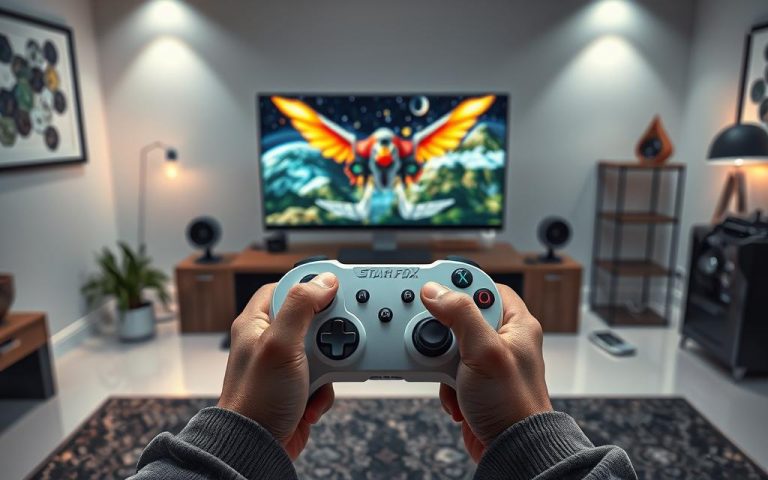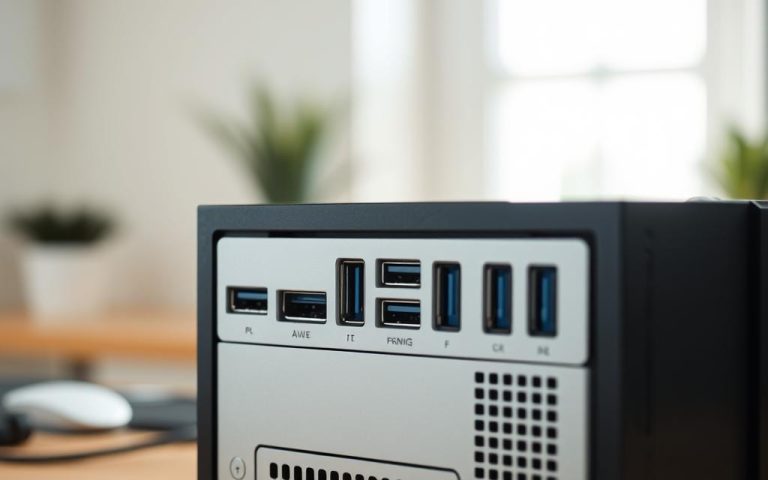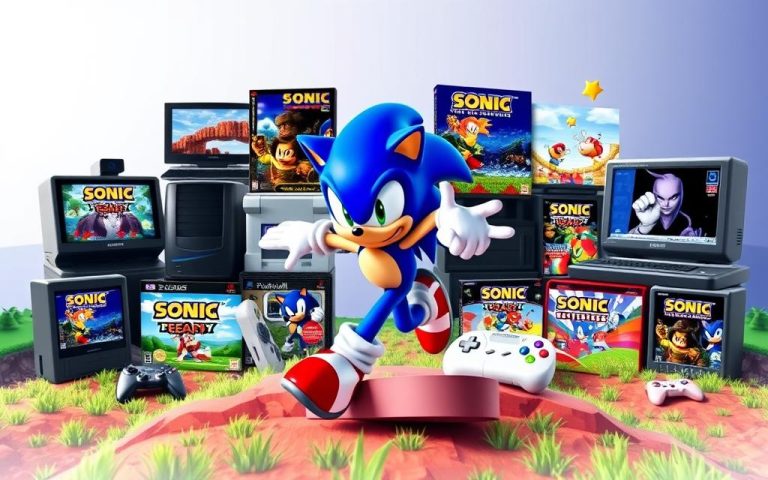Porting Games: Is It Easier to Move to PC or Consoles?
The process of adapting a game from one platform to another, known as game porting, is crucial for gamers and developers alike. By porting games to different platforms, developers can expand their audience and increase revenue.
The global console games market is diverse, with significant shares held by PC, console, and mobile platforms. As the gaming industry continues to evolve, understanding the intricacies of porting is vital for developers seeking to maximise their game’s potential across multiple ecosystems.
Our comprehensive guide will explore the technical challenges and business considerations involved in porting games to PC or consoles, providing insights to help developers make informed decisions about their game porting strategy.
Understanding Game Porting: The Basics
As the gaming industry evolves, understanding game porting is vital for success. Game porting refers to the process of adapting a game developed for one platform to run on another.
What Is Game Porting?
Game porting involves translating a game to be compatible with different operating systems or hardware, such as moving a game from a console to PC or vice versa. This process requires significant technical expertise to ensure that the game performs well on the new platform, maintaining its original quality and user experience.
The benefits of game porting include expanding the game’s audience and increasing its revenue potential. For instance, the porting of Angry Birds 2 to Windows resulted in 10 million downloads within just 10 days.
Why Publishers Choose to Port Games
Publishers choose to port games for several key reasons:
- To expand their audience reach by tapping into new market segments across different gaming platforms.
- To increase a game’s revenue potential by making it accessible to players who use different platforms.
- To extend a game’s commercial lifespan by generating additional sales beyond its original release.
- To satisfy existing fans who use multiple platforms, enhancing their overall satisfaction.
- To build their brand presence across the entire gaming ecosystem.
By porting their games, publishers can significantly enhance their revenue and broaden their market presence. As the gaming landscape continues to evolve, the importance of game porting will only continue to grow.
The Gaming Market Landscape
Understanding the gaming market landscape is crucial for developers considering porting their games across different platforms. The global gaming market is a complex ecosystem comprising console, PC, and mobile gaming sectors, each with its unique trends and revenue models.
Console Gaming Market Size and Trends
The console gaming market remains a significant player in the industry, with sales reaching $35.1 billion in 2020. This market is characterised by intense competition among major console manufacturers, driving innovation and consumer engagement. The trend towards more sophisticated hardware and exclusive titles continues to attract a dedicated player base.
PC Gaming Market Size and Trends
The PC gaming market was valued at $37 billion in 2020, showcasing its substantial contribution to the global gaming industry. PC gaming is known for its flexibility, with gamers able to upgrade their hardware and access a wide range of games through various distribution platforms. The market continues to grow, driven by advancements in hardware and the popularity of online gaming communities.
Mobile Gaming’s Influence on Porting Decisions
Mobile gaming dominates the global market, with revenues of $63.6 billion in 2020, significantly influencing game development and porting strategies. The success of mobile games has led to the concept of “reverse porting,” where popular mobile titles are adapted for console and PC platforms. Mobile gaming’s emphasis on accessibility and simplified controls has also impacted design philosophies across all platforms.
The influence of mobile gaming on the industry is further highlighted by the following trends:
- The adoption of free-to-play and games-as-a-service models pioneered by mobile gaming.
- The adaptation of game pacing and progression systems to accommodate different session lengths across platforms.
- The focus on accessibility and simplified controls in game design.
| Gaming Platform | 2020 Revenue (Billions) | Key Characteristics |
|---|---|---|
| Console | 35.1 | Exclusive titles, dedicated hardware |
| PC | 37 | Hardware upgradability, online communities |
| Mobile | 63.6 | Accessibility, free-to-play models |
Technical Foundations of Game Porting
To successfully port a game, developers must navigate the intricacies of code conversion, graphics optimisation, and user interface adaptation. This process involves a series of complex technical adjustments to ensure a seamless gaming experience across different platforms.
Code Conversion Between Platforms
Code conversion is a critical step in game porting, as it involves translating the game’s code to be compatible with the target platform’s architecture. This process can be challenging due to differences in hardware and software specifications between platforms. For instance, a game developed for a console may require significant code modifications to run on a PC, and vice versa.
The conversion process also involves optimising the game’s engine and tools to work efficiently with the new platform’s CPU and GPU. This ensures that the game performs well and provides a smooth user experience.
Graphics and Performance Optimisation
Graphics and performance optimisation are crucial for ensuring that a ported game runs smoothly on its new platform. This involves adjusting the game’s graphics settings, such as resolution and texture quality, to match the capabilities of the target platform’s hardware. Developers must also optimise the game’s performance to prevent issues like lag or frame rate drops.
To achieve this, developers use various techniques, including level of detail (LOD) adjustments, occlusion culling, and multi-threading. These optimisations help to ensure that the game is visually appealing and responsive on the new platform.
Controls and User Interface Adaptation
Adapting the controls and user interface is essential for making a ported game feel native to its new platform. For example, a game ported from a console to PC must be configured to support both mouse and keyboard controls and gamepad inputs, ideally with full control remapping options. Conversely, a PC game ported to a console must be adapted to work seamlessly with the console’s controller, such as the Xbox 360 controller.
The user interface must also be redesigned to accommodate the new platform’s input methods and screen resolution. This includes adjusting text size, button prompts, and menu navigation to ensure an intuitive user experience.
| Platform | Control Scheme | User Interface Adjustments |
|---|---|---|
| Console to PC | Mouse and keyboard support, gamepad compatibility | Redesign UI for keyboard and mouse inputs |
| PC to Console | Console controller adaptation | Adjust UI for controller inputs and screen resolution |
Is It Easier to Port to Consoles or PC?
The ease of porting a game to either console or PC depends on several key factors, including hardware standardisation and development tools. When developers consider porting, they weigh the advantages and challenges of each platform.
The Console Advantage: Standardised Hardware
One of the primary advantages of porting to console is the standardised hardware. Consoles have fixed specifications, making it easier for developers to optimise their games for a specific set of hardware. This standardisation simplifies the development process, as developers know exactly what hardware their game will run on.
Additionally, console manufacturers provide developers with development kits and tools tailored to their hardware, further streamlining the porting process. The certification process, although rigorous, ensures that games meet certain standards, potentially reducing the number of compatibility issues.
The PC Advantage: Flexible Development Tools
On the other hand, PCs offer a different set of advantages. The PC platform is characterised by a vast array of hardware configurations, which can be both a blessing and a curse. While this variability can make optimisation more challenging, it also means that developers can create games that run on a wide range of systems.
PC development benefits from more accessible and flexible development tools, with lower barriers to entry for developers compared to console development kits and certification processes. The PC platform offers more forgiving update capabilities, allowing developers to patch and improve ported games more quickly. Moreover, PC development environments typically provide superior debugging and performance analysis tools.
- PC ports can be released in early access or beta states to gather player feedback before finalisation.
- The open nature of PC platforms allows developers more freedom in implementing features.
- PC development is not constrained by the same level of certification requirements as consoles.
In conclusion, the decision to port to either console or PC depends on the specific needs and goals of the game and its developers. While console porting benefits from standardised hardware, PC porting offers flexibility and more accessible development tools.
Challenges of Porting to Consoles
The process of adapting PC games for console release is fraught with challenges, from hardware limitations to control scheme adaptations. Developers must consider various factors to ensure a successful port.
Hardware Limitations and Optimisation
One of the primary challenges of porting to consoles is dealing with the hardware limitations. Console hardware is fixed, meaning that developers must optimise their game to run smoothly on the available hardware. This can be particularly challenging for PC games that are designed to take advantage of more powerful and varied hardware configurations.
Platform Certification Requirements
In addition to hardware limitations, developers must also comply with the platform certification requirements set by console manufacturers. These requirements can include guidelines for performance, stability, and content, and failure to comply can result in delays or rejection of the game.
Control Scheme Adaptation
Adapting the control scheme of a PC game for console release can be a complex task. PC players are accustomed to using a keyboard and mouse, while console players use a controller, such as the Xbox 360 controller. Developers must ensure that the control scheme is intuitive and responsive, and that it meets the expectations of console players.
To illustrate the challenges of control scheme adaptation, consider the following table:
| Control Scheme Element | PC Version | Console Version |
|---|---|---|
| Movement | W, A, S, D keys | Left analog stick |
| Camera Control | Mouse movement | Right analog stick |
| Aiming | Right mouse button | Right trigger |
By understanding these challenges and adapting their approach accordingly, developers can successfully port their games to consoles and reach a wider audience.
Challenges of Porting to PC
The process of porting games to PC is fraught with difficulties, primarily stemming from hardware variability. Unlike console platforms, where hardware specifications are standardised, PC hardware can vary significantly between users, making optimisation a complex task.
Hardware Variability Issues
One of the main challenges of porting to PC is dealing with the vast array of hardware configurations available in the market. This includes different graphics cards, processors, and RAM sizes, which can affect the performance of the game. To address this, developers must ensure that their game is optimised for a wide range of hardware, which can be time-consuming and costly.
Graphics and Performance Expectations
PC players often have high expectations regarding graphics and performance. To meet these expectations, developers must invest in optimising their game for PC, ensuring that it runs smoothly on various hardware configurations. This can be a significant challenge, particularly for games that are graphically intensive.
Piracy Concerns and DRM Implementation
Piracy is another significant concern when porting games to PC. Pirated games can be easily distributed online, potentially impacting sales. To combat this, developers often implement Digital Rights Management (DRM) solutions. However, these solutions can sometimes negatively impact the experience of legitimate players. For instance, “always-online” DRM requirements have historically caused issues for PC ports, as seen with titles like Diablo III and Assassin’s Creed II.
The challenges of porting to PC are multifaceted, including:
- Piracy concerns significantly impacting PC porting decisions due to perceived higher piracy rates compared to consoles.
- DRM implementation creating additional technical challenges and potentially negatively impacting legitimate players’ experience.
- The need to balance protecting against piracy while providing a good user experience, which is particularly difficult on PC.
Time and Cost Considerations
Time and cost are crucial elements in the game porting process. When deciding to port a game to another platform, developers must consider several factors that impact both the timeline and the budget.
Development Timeline Differences
The development timeline for porting a game can vary significantly depending on the target platform. For instance, porting to a console often requires more time due to the need for optimization and compliance with platform-specific requirements. In contrast, PC ports might be quicker if the game is already optimized for a range of hardware configurations.
Budget Requirements for Different Platforms
The budget required for porting games can differ dramatically based on the target platform. Console ports typically demand larger investments due to the costs associated with development kits and certification processes. The cost of porting can range from $5,000 to $100,000 or more, depending on the complexity of the game and the technology used. For example, games developed with cross-platform engines like Unity or Unreal require significantly lower porting budgets compared to those built on proprietary technologies.
It’s essential for developers to carefully plan and budget for the porting process, considering the lot of factors that influence the final cost. By doing so, they can ensure a successful port that meets their development goals and provides a good return on investment.
Business Case for Console Porting
The business case for console porting is compelling, with potential for increased revenue. Porting a game to console platforms can significantly expand its market reach and provide access to a dedicated gaming audience.
Revenue Potential on Console Platforms
Console platforms offer a lucrative market for games, with console players typically engaging in longer gaming sessions compared to PC players. This can result in higher engagement metrics and retention, ultimately driving revenue. The revenue potential on console platforms is substantial, with the ability to reach new players and celebrate a new launch.
Some key benefits of console porting include:
- Access to dedicated gaming audiences who may not regularly play on PC.
- Longer gaming sessions among console players, potentially resulting in higher engagement and retention.
- The “second launch” effect, revitalising interest in a game and generating new press coverage and community growth.
User Acquisition and Engagement Benefits
Console ports can benefit from platform-specific features like achievements and trophies, which drive completionist behaviour and extend playtime. Additionally, console ecosystems often have built-in social features that enhance community building and word-of-mouth promotion, particularly for multiplayer titles.
| Benefits | Description | Impact |
|---|---|---|
| Dedicated Gaming Audience | Access to console players who may not play on PC. | New potential customers. |
| Longer Gaming Sessions | Console players engage in longer sessions. | Higher engagement and retention. |
| Platform-Specific Features | Achievements and trophies drive completionist behaviour. | Extended playtime and community growth. |
Business Case for PC Porting
The business case for PC porting is strengthened by the platform’s openness to modding and user-generated content. This openness not only extends the game’s lifespan but also fosters a dedicated community around the game.
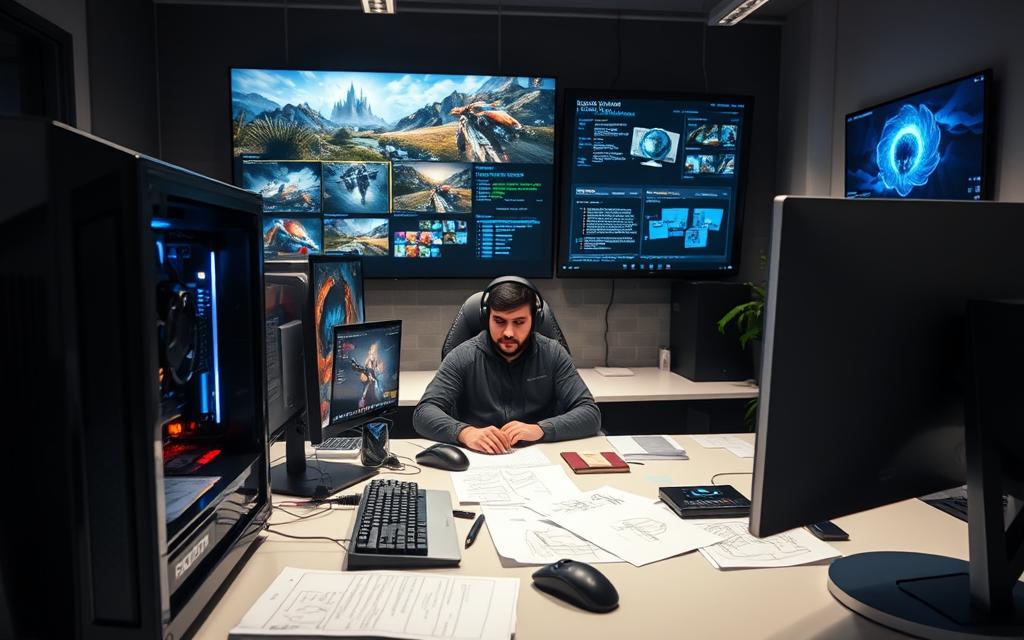
Revenue Potential on PC Platform
Porting a game to PC can significantly increase its revenue potential. The PC gaming market is vast, with a large and diverse user base willing to spend on games. According to recent market trends, the PC gaming sector continues to grow, driven by advancements in hardware and the popularity of gaming platforms like Steam.
| Platform | Revenue Potential | User Base |
|---|---|---|
| PC | High | Large and diverse |
| Console | Medium to High | Dedicated but limited |
Community Building and Modding Advantages
The PC platform’s support for modding and user-generated content offers unique advantages for community building. Modding communities can dramatically extend a game’s lifespan and player engagement. User-generated content provides free expansion content, keeping players engaged long after they would have otherwise moved on to other games.
Key benefits of PC porting include:
- Enhanced community engagement through modding and user-generated content
- Increased game longevity due to continuous community support
- Valuable feedback from vocal and connected gaming communities
- Opportunities for testing new features with community input
- Benefiting from the robust content creator ecosystem on PC
By leveraging these advantages, game developers can create a more engaging and enduring gaming experience on the PC platform.
Case Studies: Successful and Failed Ports
Game porting is a complex task, with some titles achieving seamless transitions between platforms, while others falter. The outcome largely depends on the strategies employed during the porting process and the challenges that developers face.
Success Stories: Games That Ported Well
Several games have successfully made the transition between platforms, offering valuable insights into effective porting strategies. These success stories often involve meticulous planning, robust development tools, and thorough quality assurance processes. For instance, certain console games have been ported to PC, expanding their player base and enhancing the gaming experience.
Successful ports often result from a deep understanding of both the source and target platforms, allowing developers to optimise the game accordingly. This includes adapting to different hardware configurations, particularly when moving from console to PC or vice versa.
Cautionary Tales: When Porting Goes Wrong
Conversely, there are numerous examples of game ports that have encountered significant issues. For example, Batman: Arkham Knight’s PC port was marred by technical problems at launch, including severe performance issues that prompted Warner Bros. to temporarily halt sales and offer refunds. Similarly, Splinter Cell: Double Agent (2006) suffered from a broken lighting system in its PC version, which undermined the game’s stealth mechanics.
Other notable examples include Diablo III and SimCity (2013), which faced major disruptions due to “always-online” DRM requirements, causing frustration among players. Saints Row 2’s PC port also experienced timing issues related to CPU clock speeds, leading to unresolved physics and gameplay problems. More recently, Horizon Zero Dawn’s initial PC release was criticised for numerous technical issues, despite being developed by a major studio.
These cautionary tales highlight the importance of thorough testing, player-centric design, and careful consideration of platform-specific features to ensure a smooth gaming experience across different platforms.
Best Practices for Successful Game Porting
Successful game porting requires meticulous planning and execution to ensure a seamless gaming experience across different platforms. When considering a port, it’s crucial to understand the technical and market-related aspects that can make or break the success of your game on a new console.
Planning Your Porting Strategy
Effective planning involves assessing the feasibility of the port, understanding the target audience, and identifying the necessary resources. This includes evaluating the game’s current architecture and determining the modifications required to meet the specifications of the target console or PC platform.
Choosing the Right Development Partners
Selecting the right development partner is vital for the success of your port. Look for developers with a proven track record in porting games to the desired platform. They should have the technical expertise to handle the complexities involved and understand the market trends that can impact your game’s performance.
Quality Assurance for Ported Games
Quality assurance is a critical phase that requires a tailored approach for each platform. To ensure a high-quality version of your game, implement the following strategies:
- Develop platform-specific testing strategies to address unique characteristics and potential failure points.
- Utilise automated testing where possible, supplemented by manual testing by experienced QA specialists.
- Test on actual target hardware across the full spectrum of supported configurations, particularly for PC ports.
- Gather feedback from platform-specific test groups to understand user expectations.
- Establish clear performance benchmarks for each platform and test extensively.
By amalgamating data from all versions of your game, you can identify trends specific to a platform and those generalised to your game design. Tools like DataSuite can be invaluable in collecting and studying data from multiple platforms, helping you refine your porting strategy and improve the overall user experience for players.
Future Trends in Cross-Platform Development
The trend towards cross-platform gaming is reshaping the way developers create and players enjoy their favourite games. As we move forward, it’s clear that the lines between different console ecosystems are blurring, offering a more unified gaming experience.
Several key trends are driving this shift. Engine technologies are playing a crucial role in simplifying the porting process.
Engine Technologies Simplifying Porting
Modern game engines are equipped with features that facilitate cross-platform development. These engines provide tools and frameworks that allow developers to create a game once and deploy it across multiple platforms with minimal modifications. This not only saves time but also reduces the cost associated with developing separate versions for different console systems.
- Advanced rendering capabilities that adapt to various hardware specifications.
- Unified scripting languages that work across different platforms.
- Built-in support for cross-play functionality, enabling players to interact seamlessly across different devices.
Cross-Play and Unified Gaming Ecosystems
Cross-platform play is becoming increasingly common, as we explored in our trends for 2024. This shift is driven by several factors, including the growing expectation for seamless gaming experiences across different devices.
- Platform holders are gradually opening their ecosystems to cross-platform play, reducing historical barriers to unified gaming experiences.
- Cloud gaming services are blurring the lines between platforms, potentially simplifying porting by allowing a single version to stream to multiple device types.
- Account and progression synchronisation across platforms is becoming standard, encouraging developers to implement cloud-based save systems.
As the gaming industry continues to evolve, the importance of cross-platform development will only grow. By embracing these trends, developers can create more inclusive and engaging games that cater to a broader audience, ultimately enhancing the gaming experience for gamers worldwide.
Conclusion: Making the Right Porting Decision
Whether it’s easier to port games to PC or consoles depends on various aspects of the game and development team. The decision to port a game to a new platform is complex and influenced by multiple factors, including technical capabilities, market trends, and business objectives.
The console advantage lies in its standardised hardware, making it easier to optimise games for specific configurations. However, this comes with stricter certification requirements and potential technical limitations. On the other hand, PC porting offers more flexible development tools and access to a potentially larger audience, but it introduces challenges with hardware variability and higher players’ expectations for customisation.
A successful porting strategy begins with a realistic assessment of a game’s suitability for new platforms. It’s crucial to consider budget implications, as porting costs can range from $5,000 to $100,000 or more, potentially reaching half or more of the original development budget. Timeline expectations must also be realistic, with most ports requiring 3-6 months for simpler games and potentially a year or more for complex titles.
The business case for porting should consider not just immediate revenue potential but also long-term benefits like expanded audience reach, extended product lifespan, and increased brand presence. As cross-platform technologies continue to evolve, the barriers between gaming platforms are gradually diminishing, potentially making future porting efforts less resource-intensive.
Ultimately, successful porting requires a combination of technical expertise, platform-specific knowledge, and a commitment to delivering an authentic experience that feels native to each platform rather than a compromised conversion. By carefully weighing the advantages and challenges of console and PC porting, developers can make informed decisions that maximise their game’s potential and satisfy both gamers and their bottom line.
Despite all the challenges and costs of porting, it can be a well-landed big win for your game — both in terms of players’ satisfaction and your revenue. It’s not always about whether PC or console is always better; it’s about choosing the right platform for your game.
FAQ
What are the key considerations when deciding whether to port a game to PC or consoles?
When deciding whether to port a game to PC or consoles, developers should consider factors such as hardware variability, control scheme adaptation, and revenue potential. PC ports require optimisation for a wide range of hardware configurations, while console ports benefit from standardised hardware.
How do console manufacturers’ certification requirements impact the porting process?
Console manufacturers, such as Sony and Microsoft, have strict certification requirements that games must meet before they can be released on their platforms. This can impact the porting process, as developers must ensure their game meets these requirements, which can include optimisation for specific hardware, content guidelines, and testing protocols.
What are the benefits of porting a game to PC in terms of community building?
Porting a game to PC can provide opportunities for community building and modding, as PC gamers often create and share custom content. This can extend the game’s lifespan and attract new players.
How does the development timeline differ between console and PC ports?
The development timeline for console and PC ports can differ due to factors such as hardware optimisation, certification requirements, and testing protocols. Console ports may require more time for optimisation and certification, while PC ports may require more time for testing on a wide range of hardware configurations.
What role do game engines play in simplifying the porting process?
Modern game engines, such as Unity and Unreal Engine, provide tools and features that simplify the porting process, including cross-platform support and automated optimisation. This can reduce the time and cost associated with porting a game.
How do piracy concerns impact the decision to port a game to PC?
Piracy concerns can impact the decision to port a game to PC, as PC games are often more vulnerable to piracy. Developers may need to implement DRM (Digital Rights Management) solutions to protect their game.
What are the revenue potential differences between console and PC ports?
The revenue potential for console and PC ports can differ due to factors such as market size, pricing, and distribution channels. Console ports may benefit from a more established market, while PC ports may offer more flexibility in terms of pricing and distribution.

